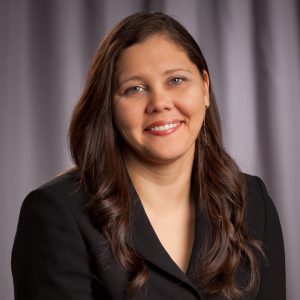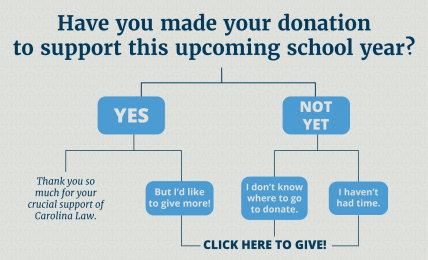
Erin Locklear ’02 is from Fairmont, a small town in southeastern North Carolina, where her mother and father still live in her childhood home. She is a member of the Lumbee Tribe. Locklear is General Counsel for the Raleigh-Durham Airport Authority, which operates the RDU International Airport. In that role, she provides legal advice on matters involving the Airport and the Authority. Her areas of practice include state and federal legal and regulatory compliance, land use, employment, airline and concessions agreements, public art, ground transportation, contracts, and first amendment issues. She also manages the procurement, FAA civil rights, business diversity, ADA, insurance, risk management, and safety functions.
What has been your legal journey since graduating?
After graduation, I went to work at a small-ish law firm in Durham. Within the year, that law firm closed and I went on to work with a subset of those lawyers who formed a new firm. As the only associate at that firm, I practiced in all of the areas of the firm’s practice – real estate, trust and estates, litigation, and corporate law. After 5 years in private practice, I looked for a different opportunity and fortuitously the RDU Airport Authority (RDUAA) was also looking for its first in-house staff attorney. Over 15 years later, I’m still lucky enough to have my dream job as RDUAA’s General Counsel.
What is the one thing you learned at Carolina Law that has guided you throughout your legal career?
It is impossible to pick only one thing! Can I negotiate to have two things?! There are so many things I learned – legal lessons as well as life lessons. Bush v. Gore occurred when I was a 2L, and 9/11 happened during my 3L year. Both of these events (and many more) became part of my classwork, and the framework of all of our lives. But most of all, I’d say there were two things I learned at Carolina Law that shaped my career.
The first was the value of preparation. I quickly learned that I could handle the storied (and terrifying!) Socratic method well by being as prepared as possible (reading the cases, book briefing, etc.). When I wasn’t prepared, I was terrified I’d get called on! I strongly preferred the former to the latter. The value of preparation was a valuable lesson that has carried me through many challenges.
The second is the value of critical thinking. I am grateful that I had a number of professors (Daye, Byrd, Muller, Boger, Kelley, Hornstein, Broun, Corrado, etc.) whose classes explicitly or implicitly included critical thinking, particularly critical race theory and critical feminism. The ability to recognize my own viewpoint, as well as others’ viewpoints, coupled with the ability to think beyond those viewpoints in an inquisitive and curious way continues to be a foundation for my legal practice (and my approach to life). My world and my career would be less engaging and less rich without the learned ability to think critically. I was lucky enough to be taught those skills by inspiring Carolina Law faculty with some amazing classmates. I am forever grateful.
Tell us about your responsibilities as General Counsel at RDU? What is the best part of your job?
I like to joke that my role as General Counsel is like a puddle – really broad and not very deep. I say that to describe my role as an all-purpose lawyer, where I have to know a little about a lot of things. While I access subject matter experts (including outside counsel) when prudent, I have to act as the quarterback and utility player in all matters (employment, state and federal regulatory compliance, land use, construction, leases and operating agreements, etc.). I supervise a team that also has responsibility for procurement, internal audit, risk management, safety, insurance, DEI implementation, and the federal and local small minority and women-owned business program. I am very lucky that I get to practice a sophisticated level of legal work for the benefit the traveling public, and I take that privilege and responsibility seriously.
I am incredibly proud to do that work at RDUAA with some great colleagues. My favorite part of that work is that I get to interact everyday with a wide variety of people. I am able to spend time with folks who cut grass to first responders to prominent business and political leaders. I value that variety and feel that my own personal background (growing up in Robeson County to attend some of the leading nation’s leading educational institutions, including Carolina Law) helps me genuinely appreciate and connect with a wide variety of people. It is those connections – knowing about their families, what types of candy they prefer from the candy dish in my office, what is important to them, what bothers them – that keep my job interesting and fulfilling and help me be a better lawyer. That’s my favorite part!
As a Native attorney, where do you see opportunities for the legal profession to increase diverse representation? How can Carolina Law be part of this change?
Whew – this is a big question! I have never been able to practice with another Native attorney. I have only ever encountered one Native attorney while representing my client — a personal injury attorney who was representing an adverse party. There are no Native attorneys in any of the industry-specific trade organizations to which I belong. I wish that this wasn’t the case and I’ve worked to try to improve it, but this absence allows me an opportunity to build bridges to connect with folks who have a background different than mine.
I think our profession must do that as well – build bridges to connect with others who have a different background than our own. A bridge-building approach to hiring, mentoring, outreach, and sponsorship helps build and foster an inclusive environment. Some ways to do this are to make sure that attorneys (and future attorneys) know that they are a welcome member of the bar/firm/organization; that they know the written and unwritten rules by which their performance is judged We have to work to ensure that the scales used to measure performance are fair and accessible. Carolina Law provides a great avenue for mentorship, outreach, hiring, and sponsorship and for alumni and students of all backgrounds to build bridges and develop connections. I have enjoyed meeting students and trying to provide help as they navigate crafting the start of their legal careers.
As for Native American lawyers and law students particularly, I believe there is some work to be done at Carolina Law. Even though classes that focus on Native American law are taught at many law schools throughout the country, no such classes were available to me while I was a student at Carolina Law. I felt like I had to choose between pursuing that course of study and attending law school close to my family. It would have been wonderful to be able to do both, and Carolina Law could be a leader in this very interesting and broadly relevant subject matter.
What is your fondest memory of your time at Carolina Law?
There are so many! One light-hearted memory started in my first year and lasted until graduation. When any one of a small group of friends distinguished ourselves in class, they would received a small star sticker. The recipient would put that star sticker on the inside of the textbook cover, where it stayed. I know it sounds like such a little thing, but it was fun to be able to give and receive those stickers. Even now, over 20 years later I have kept some of those textbooks and giggle every time I open them and see those stars. A life lesson on the joy in little things and the affirming power of friendship!



